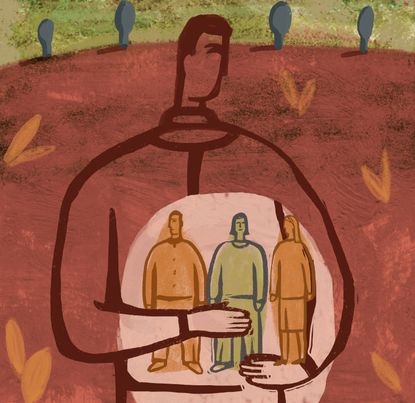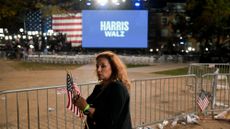Leave my family alone, President Trump
President Trump's immigration order is targeting patriotic Americans who have done absolutely nothing wrong


We're barely a week into our national misrule by misbegotten vandals, shameless grifters, and their opportunistic apologists. And already, President Trump has driven Americans back into the streets (and airports) in furious protest of his ham-fisted Muslim ban.
Trump's ban on nationals from seven Muslim-majority countries, and his halt to all refugees entering the country, created unnecessary confusion, chaos, and hardship. But worse, the order is immoral, arbitrary, and deeply counterproductive to the national security of the United States. It should be contested vigorously, for all countries and people that are targeted. But allow me to focus specifically on the ban on Iranians, which makes less sense than a diagram of one of Trump's sentences.
Like the Iranian-American family I married into four years go, Iranians as a group are unusually successful and well integrated into American society, a status that can be traced back to the particular contours of the post-revolutionary exodus from Iran. Those most likely to emigrate to the U.S. were the ones most threatened by the new theocratic Iranian regime: landowners, merchants, artists, elites from the shah's regime, and opponents of the emerging theocratic order. Especially for a group of people who were functionally fleeing persecution, this was about as ideal a group of immigrants as the United States could ever hope to recruit. Today's Iranian-American community of roughly 1 million is in the aggregate more well off and more highly educated than the average American.
Subscribe to The Week
Escape your echo chamber. Get the facts behind the news, plus analysis from multiple perspectives.

Sign up for The Week's Free Newsletters
From our morning news briefing to a weekly Good News Newsletter, get the best of The Week delivered directly to your inbox.
From our morning news briefing to a weekly Good News Newsletter, get the best of The Week delivered directly to your inbox.
Many members of my wife's family came to the United States for school before the revolution in the early 1970s. In classic chain-migration fashion, the early immigrants, including my father-in-law and my mother-in-law, were later joined by their siblings and parents as the situation in Iran became increasingly dire during the post-revolutionary period and the Iran-Iraq War. They persevered through the racist hostility that followed the hostage crisis and are now firmly embedded in American society as doctors, lawyers, engineers, small business owners, and more. Far from a monolith, my adopted family is politically and religiously heterodox and defies easy categorization. Many, having survived the tumultuous period of American-Iranian relations in the early '80s (when the U.S. banned Iranian students in retaliation for the seizure of the U.S. Embassy in Tehran), have a faith in the goodness and resilience of Americans and American institutions that surpasses my own.
My Iranian-American family still has economic and family ties in Iran. This ban will adversely affect their interests in exchange for no conceivable public good. Indeed, most Iranian-American families are a complicated mix of American-born citizens, naturalized Americans, green card holders, and people who live overseas or in Iran. How does it benefit the security of the United States to prevent its own citizens from being visited by their aunts and uncles who live in Tehran or London? Even family members who hold American passports are nervous about traveling now. Who knows how our incompetent, paranoid president might react to the next fusillade of "alternative facts" about Iranians that airs on Fox News. Are naturalized citizens next?
Let us be clear: Trump's order alienates and imposes hardship on hundreds of thousands of hardworking, patriotic people who have done absolutely nothing wrong. The message Trump and the clique of ugly fanatics that has his ear just sent to my family is this: Decades of model citizenship are not enough. You can never earn our trust.
Perhaps the order would at least feature some internal coherence if Iranians were turning up in the Raqqa phonebook, driving trucks into French crowds, or mass murdering Americans in public places. But Iranian private citizens have never been implicated in a major transnational terrorist incident. While Iranian agents are believed to have been involved in several high-profile attacks, including the 1996 bombing of the Khobar Towers complex in Saudi Arabia (a charge that remains disputed), ordinary Iranians are fighting ISIS, not joining it. The doctrinaire Sunni extremism of ISIS, al Qaeda, and its offshoots holds no appeal even to religious extremists in Iran. You don't need a degree in religious studies to understand that Shi'a Muslims — the majority in Iran — are the targets of ISIS theology rather than its recruits, cast as apostates and marked for elimination.
Not only are Iranian citizens not a global terrorist threat in any meaningful sense, the Iranian-American community has never produced a single homegrown radical. Remember, Syed Farook, the Pakistani-American who carried out the San Bernardino attacks, was an American citizen born in Chicago. Orlando shooter Omar Mateen was born in New York to Afghani immigrants. Stopping such self-radicalized individuals before they kill is one of the most difficult challenges facing law enforcement, and requires cooperation from local immigrant communities as well as assistance from their countries of origin. Trump's ridiculous actions will undermine these goals on every front.
The capricious banning of Iranians from entering the United States was designed not to enhance U.S. security but as a backhanded way to fulfill Trump's vindictive pledge to destroy the Joint Comprehensive Plan of Action (JCPOA), better known as the Iran deal. The agreement, signed in July 2015, has so far been an overwhelming success in its stated goal of preventing the Iranian regime from pursuing or acquiring nuclear weapons. While it has not eliminated Iranian conduct in the region that troubles U.S. policymakers, a grand bargain was never the goal of these negotiations. Yet from the start, the deal was vulnerable to outbidding from hostile, newly elected elites on either side. As an "executive agreement" rather than a Senate-ratified treaty, the deal depends on the continued cooperation of the signatories. In effect, whoever withdraws that goodwill first will be blamed for the ensuing breakdown in an already-tenuous bilateral relationship.
By attacking Iran on a separate front, the Trump administration has triggered precisely such a diplomatic crisis and caused the Iranian regime to respond harshly with its own ban of U.S. citizens entering Iran. The position of Iran's president, Hassan Rouhani, is dependent on his relationship with the ruling clerical elite and the supreme leader — in other words, he has considerably less authority than the American president. If hardline actors inside the Iranian regime decide that this is the opening gambit in an American attempt to isolate Iran, re-impose sanctions, or destroy the JCPOA, they may decide to forego cooperation with the terms of the deal altogether. Trump's thoughtless order could even help bring a new, hardline president into power in Iran, someone who would make Mahmoud Ahmedinejad look like a statesman.
This executive action is a classic Trump move — something that leaves everyone but the president himself worse off. It is an offense against American values. Shame on you, Mr. President.
Sign up for Today's Best Articles in your inbox
A free daily email with the biggest news stories of the day – and the best features from TheWeek.com
David Faris is an associate professor of political science at Roosevelt University and the author of It's Time to Fight Dirty: How Democrats Can Build a Lasting Majority in American Politics. He is a frequent contributor to Informed Comment, and his work has appeared in the Chicago Sun-Times, The Christian Science Monitor, and Indy Week.
-
 Democrats eye a new strategy after Trump victory
Democrats eye a new strategy after Trump victoryThe Explainer Party insiders and outside analysts are looking for a way to recapture lost working-class support
By Justin Klawans, The Week US Published
-
 Crossword: November 27, 2024
Crossword: November 27, 2024The Week's daily crossword
By The Week Staff Published
-
 Sudoku hard: November 27, 2024
Sudoku hard: November 27, 2024The Week's daily hard sudoku puzzle
By The Week Staff Published
-
 US election: who the billionaires are backing
US election: who the billionaires are backingThe Explainer More have endorsed Kamala Harris than Donald Trump, but among the 'ultra-rich' the split is more even
By Harriet Marsden, The Week UK Published
-
 US election: where things stand with one week to go
US election: where things stand with one week to goThe Explainer Harris' lead in the polls has been narrowing in Trump's favour, but her campaign remains 'cautiously optimistic'
By Harriet Marsden, The Week UK Published
-
 Is Trump okay?
Is Trump okay?Today's Big Question Former president's mental fitness and alleged cognitive decline firmly back in the spotlight after 'bizarre' town hall event
By Harriet Marsden, The Week UK Published
-
 The life and times of Kamala Harris
The life and times of Kamala HarrisThe Explainer The vice-president is narrowly leading the race to become the next US president. How did she get to where she is now?
By The Week UK Published
-
 Will 'weirdly civil' VP debate move dial in US election?
Will 'weirdly civil' VP debate move dial in US election?Today's Big Question 'Diametrically opposed' candidates showed 'a lot of commonality' on some issues, but offered competing visions for America's future and democracy
By Harriet Marsden, The Week UK Published
-
 1 of 6 'Trump Train' drivers liable in Biden bus blockade
1 of 6 'Trump Train' drivers liable in Biden bus blockadeSpeed Read Only one of the accused was found liable in the case concerning the deliberate slowing of a 2020 Biden campaign bus
By Peter Weber, The Week US Published
-
 How could J.D. Vance impact the special relationship?
How could J.D. Vance impact the special relationship?Today's Big Question Trump's hawkish pick for VP said UK is the first 'truly Islamist country' with a nuclear weapon
By Harriet Marsden, The Week UK Published
-
 Biden, Trump urge calm after assassination attempt
Biden, Trump urge calm after assassination attemptSpeed Reads A 20-year-old gunman grazed Trump's ear and fatally shot a rally attendee on Saturday
By Peter Weber, The Week US Published